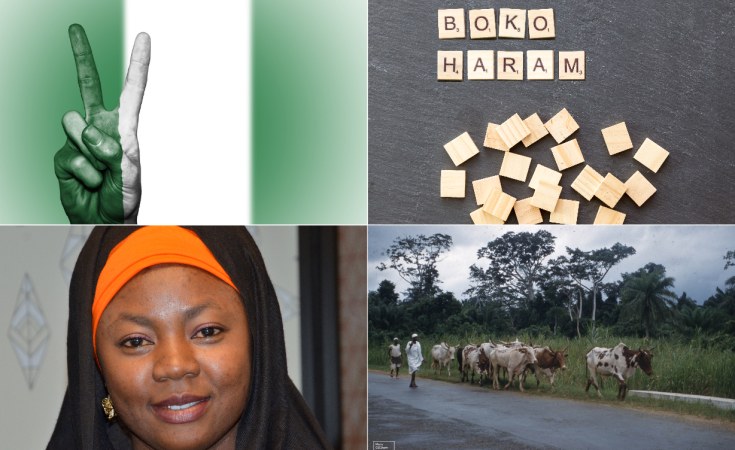Johannesburg — Corruption, oil disputes, inequality, the Boko Haram insurgency, and violence between farmers and herders and those of different religious groupings entwine, presenting a country filled with complicated challenges. Despite the government announcing that it beat Boko Haram in 2016, the deadly suicide bombings continued in 2018 and still does. In fact, a week after President Muhammadu Buhari announced the "final crushing" of Boko Haram, the leader of the terror group Abubakar Shekau released a video disputing Buhari's statement.
These conflicts and resulting humanitarian crisis have left thousands of people dead and millions displaced. The severe drought and impending famine across North East Nigeria is also forcing people to abandon their homes and land. The World Humanitarian Data and Trends 2018 report found that Nigeria was one of worst-affected countries that experienced crisis-level food insecurity in 2017. Current levels of food insecurity shows that the government maybe under-investing in agriculture in the country.
Fatima Madaki, one of the nation's many young peacebuilders, believes that influencing policy, religious tolerance, and going "beyond just the stereotypes about farmer and herder conflict" is key to moving Nigeria towards a more peaceful path.
"There are deeper issues that touch on the economy and on politics," Madaki, who works for Search for Common Ground Nigeria (SFCGNigeria), says. With this non-governmental organisations, she collaborates with young people and faith groups to discuss issues that divide the country.
Over 3,000 people have died in clashes between herders and farmers over the past three years - a higher toll than the number of people who were killed from terror attacks by Boko Haram. This is according to the December 2018 report from the rights group Amnesty International titled Harvest of Death: Thee Years of Bloody Clashes Between Farmers and Herders in Nigeria.
The report also found that more than half of the recorded deaths occurred in 2018. In some cases, security forces had prior warning of a raid but "did nothing to stop or prevent the killings, looting and burning of homes". Communities in the the country's vast rural areas are more vulnerable from militant attacks and it seem that Nigerian security forces are failing to protect them, Amnesty goes on to say.
A long-running SFCG Nigeria project is Forum on Farmer-Herder Relations in Nigeria (FFARN), which - through consultative meetings shares knowledge between peacebuilding practitioners and scholars - seeks to change and influence policies, highlighting emerging risks and seizing opportunities for solutions.
Search for Common Ground is working to end the kind of situation trying to find peaceful solutions that led to the attack where Imam Abubakar Abdullahi was forced into action. The imam, who is Hausa, and his assistant Umar Abdullahi, who is Fulani, rescued hundreds of people fleeing attackers in Yelwan Gindi Akwati, Swei and Nghar villages in the Barkin Ladi Local Government Area of Plateau.
Imam Abdullahi and Umar saved the lives of mostly Christians by hiding them in their mosque and the home of the Muslim holy man. The 83-year-old Muslim cleric has since met with Nigeria VP been honoured with the International Religious Freedom Award from the U.S. State Department in its first ceremony to honor extraordinary advocates of religious freedom from around the world.
"The recognition that Imam Abubakar Abdullahi received is well-deserved. I feel what he did in Barkin Ladi, Plateau State, is highly commendable. Ensuring that people from another faith are safe from threats to life. I've walked in Barkin Ladi in the past and I know what the situation is there. It's impressive to see that someone at his age is still hopeful and believes that he has a role to play in changing the dynamics of conflict in the community.
"We need role models like this so that young people like me can continue to have hope in Nigeria, have hope in the peacebuilding processes ... and also to believe in the change that we want to see. We all can work together differently in all our spheres of life to ensure that peace is gained in Nigeria," Madaki said.
allAfrica's reporting on peacebuilding is supported by a grant from Carnegie Corporation of New York.


